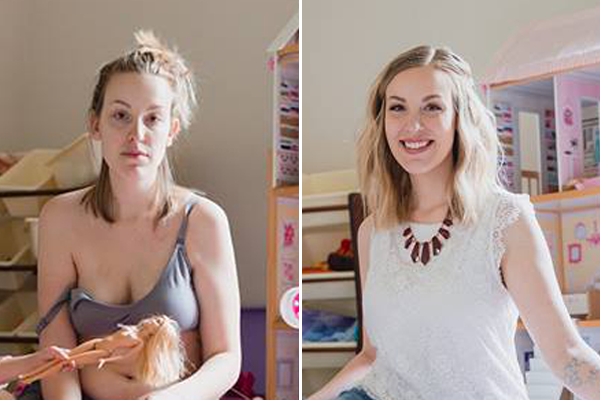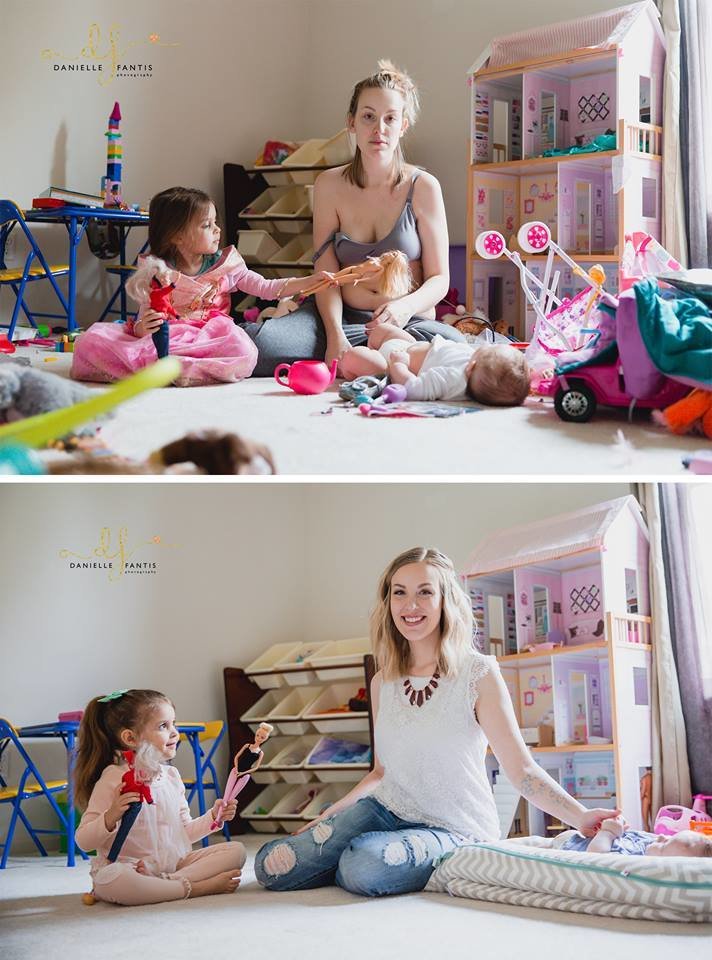As a doula, childbirth educator, and owner of Beyond the Bump in Ohio, Kathy DiVincenzo, a mother of two who has PPD, felt like she needed to remove the filter of perfection from her life in order to make a powerful statement about postpartum depression. To do this, she shared a striking side-by-side photo on Facebook that shows the reality of PPD and why mothers who have it should never feel ashamed. More from CafeMom: 10 Moms Reveal What Postpartum Depression Really Feels Like Kathy DiVincenzo/Facebook “May has been declared Postpartum Depression Awareness Month, and as someone with diagnosed postpartum depression, anxiety, and OCD, I feel like it’s time to show you what that can really look like, not just the side of me that’s ‘Facebook-worthy,’” the mom writes. She continues: More from CafeMom: Postpartum Depression vs. Baby Blues: 9 Ways to Tell the Difference We need to start asking new parents how they’re doing in a deeper way than the normal, ‘so how are you doing?’ that triggers the knee jerk, ’everything’s great!’ response. We need to learn the signs, symptoms, risk factors, and support plans for postpartum conditions. We need to break the stigma and #EndTheSilence by sharing our stories and letting others know they’re not alone. The American Psychological Association estimates roughly one in seven women experiences postpartum depression. That, along with the need to end the stigma surrounding postpartum depression once and for all, is why Kathy’s Facebook post has been shared over 67,000 times. The mom says she hopes her heartfelt post not only raises awareness, but also encourages the mom community to check in on friends and loved ones who could be suffering in silence. “I think this is important to see because, while I certainly am not trying to represent postpartum mental illness as a whole, I hope to raise awareness that these are real conditions that could be affecting you, your sister, [and] your friend,” DiVincenzo tells CafeMom. “It’s crucial to be checking in with parents, especially throughout that first year, to really know how they’re doing.” More from CafeMom: I Suffered From Postpartum Depression & Didn’t Even Know It Sharing Kathy’s sentiments is Danielle Fantis, friend of the mom and the owner of Danielle Fantis Photography. She took these photos that resonate on such a personal level. “Taking these images stirred up a lot of emotion for me,” Fantis reveals to CafeMom. “I feel like agony when I look at them. I feel her suffering because I also suffered from PPD. While I’m sad that thousands of women have related to this and shared our experience with PPD, I’m happy that they know they’re not alone! I hope the women who are suffering see that they aren’t alone in this, that they feel loved and worthy, and that they’re able to get the right help and see a light at the end of this dark tunnel that is postpartum depression.” Kathy’s photos gave me pause, as I’m so guilty of hiding behind the camera — and hiding many of the realities of raising 3- and almost 2-year-old boys that don’t look spectacular, no matter how many filters I apply. I’ve always felt this unseen pressure to emulate a kind of perfection that’s just not achievable and, honestly, not even super desirable (#AintNobodyGotTimeforThat). I find myself relating to images of motherhood — like Kathy’s top photo — because it so often represents the reality of my life … especially during the early days of juggling hormones, a toddler, and a fresh newborn. There were so many times when I didn’t speak up if I felt “a little off” or avoided asking questions to the mothers I knew out of fear of being judged or being treated as if I was weak in some way. More from CafeMom: 5 Warning Signs You Could Have Postpartum Depression I’m so thankful for women like Kathy who aren’t afraid to stand in their truth and empower others to be both unashamed and no longer afraid. As Kathy writes in her post: “In case no one has told you, you’re doing an amazing job. You are loved and you are worthy. You’re not alone. Information to local and national support will be in the comment section. I know how unbelievably hard it is to reach out, but I promise you it is worth it. YOU’RE worth it.”



title: “Mom S Powerful Photos Show The Reality Of Postpartum Depression” ShowToc: true date: “2024-09-27” author: “Stanley Vaccaro”
As a doula, childbirth educator, and owner of Beyond the Bump in Ohio, Kathy DiVincenzo, a mother of two who has PPD, felt like she needed to remove the filter of perfection from her life in order to make a powerful statement about postpartum depression. To do this, she shared a striking side-by-side photo on Facebook that shows the reality of PPD and why mothers who have it should never feel ashamed. More from CafeMom: 10 Moms Reveal What Postpartum Depression Really Feels Like Kathy DiVincenzo/Facebook “May has been declared Postpartum Depression Awareness Month, and as someone with diagnosed postpartum depression, anxiety, and OCD, I feel like it’s time to show you what that can really look like, not just the side of me that’s ‘Facebook-worthy,’” the mom writes. She continues: More from CafeMom: Postpartum Depression vs. Baby Blues: 9 Ways to Tell the Difference We need to start asking new parents how they’re doing in a deeper way than the normal, ‘so how are you doing?’ that triggers the knee jerk, ’everything’s great!’ response. We need to learn the signs, symptoms, risk factors, and support plans for postpartum conditions. We need to break the stigma and #EndTheSilence by sharing our stories and letting others know they’re not alone. The American Psychological Association estimates roughly one in seven women experiences postpartum depression. That, along with the need to end the stigma surrounding postpartum depression once and for all, is why Kathy’s Facebook post has been shared over 67,000 times. The mom says she hopes her heartfelt post not only raises awareness, but also encourages the mom community to check in on friends and loved ones who could be suffering in silence. “I think this is important to see because, while I certainly am not trying to represent postpartum mental illness as a whole, I hope to raise awareness that these are real conditions that could be affecting you, your sister, [and] your friend,” DiVincenzo tells CafeMom. “It’s crucial to be checking in with parents, especially throughout that first year, to really know how they’re doing.” More from CafeMom: I Suffered From Postpartum Depression & Didn’t Even Know It Sharing Kathy’s sentiments is Danielle Fantis, friend of the mom and the owner of Danielle Fantis Photography. She took these photos that resonate on such a personal level. “Taking these images stirred up a lot of emotion for me,” Fantis reveals to CafeMom. “I feel like agony when I look at them. I feel her suffering because I also suffered from PPD. While I’m sad that thousands of women have related to this and shared our experience with PPD, I’m happy that they know they’re not alone! I hope the women who are suffering see that they aren’t alone in this, that they feel loved and worthy, and that they’re able to get the right help and see a light at the end of this dark tunnel that is postpartum depression.” Kathy’s photos gave me pause, as I’m so guilty of hiding behind the camera — and hiding many of the realities of raising 3- and almost 2-year-old boys that don’t look spectacular, no matter how many filters I apply. I’ve always felt this unseen pressure to emulate a kind of perfection that’s just not achievable and, honestly, not even super desirable (#AintNobodyGotTimeforThat). I find myself relating to images of motherhood — like Kathy’s top photo — because it so often represents the reality of my life … especially during the early days of juggling hormones, a toddler, and a fresh newborn. There were so many times when I didn’t speak up if I felt “a little off” or avoided asking questions to the mothers I knew out of fear of being judged or being treated as if I was weak in some way. More from CafeMom: 5 Warning Signs You Could Have Postpartum Depression I’m so thankful for women like Kathy who aren’t afraid to stand in their truth and empower others to be both unashamed and no longer afraid. As Kathy writes in her post: “In case no one has told you, you’re doing an amazing job. You are loved and you are worthy. You’re not alone. Information to local and national support will be in the comment section. I know how unbelievably hard it is to reach out, but I promise you it is worth it. YOU’RE worth it.”



title: “Mom S Powerful Photos Show The Reality Of Postpartum Depression” ShowToc: true date: “2024-09-06” author: “Gene Mccullough”
As a doula, childbirth educator, and owner of Beyond the Bump in Ohio, Kathy DiVincenzo, a mother of two who has PPD, felt like she needed to remove the filter of perfection from her life in order to make a powerful statement about postpartum depression. To do this, she shared a striking side-by-side photo on Facebook that shows the reality of PPD and why mothers who have it should never feel ashamed. More from CafeMom: 10 Moms Reveal What Postpartum Depression Really Feels Like Kathy DiVincenzo/Facebook “May has been declared Postpartum Depression Awareness Month, and as someone with diagnosed postpartum depression, anxiety, and OCD, I feel like it’s time to show you what that can really look like, not just the side of me that’s ‘Facebook-worthy,’” the mom writes. She continues: More from CafeMom: Postpartum Depression vs. Baby Blues: 9 Ways to Tell the Difference We need to start asking new parents how they’re doing in a deeper way than the normal, ‘so how are you doing?’ that triggers the knee jerk, ’everything’s great!’ response. We need to learn the signs, symptoms, risk factors, and support plans for postpartum conditions. We need to break the stigma and #EndTheSilence by sharing our stories and letting others know they’re not alone. The American Psychological Association estimates roughly one in seven women experiences postpartum depression. That, along with the need to end the stigma surrounding postpartum depression once and for all, is why Kathy’s Facebook post has been shared over 67,000 times. The mom says she hopes her heartfelt post not only raises awareness, but also encourages the mom community to check in on friends and loved ones who could be suffering in silence. “I think this is important to see because, while I certainly am not trying to represent postpartum mental illness as a whole, I hope to raise awareness that these are real conditions that could be affecting you, your sister, [and] your friend,” DiVincenzo tells CafeMom. “It’s crucial to be checking in with parents, especially throughout that first year, to really know how they’re doing.” More from CafeMom: I Suffered From Postpartum Depression & Didn’t Even Know It Sharing Kathy’s sentiments is Danielle Fantis, friend of the mom and the owner of Danielle Fantis Photography. She took these photos that resonate on such a personal level. “Taking these images stirred up a lot of emotion for me,” Fantis reveals to CafeMom. “I feel like agony when I look at them. I feel her suffering because I also suffered from PPD. While I’m sad that thousands of women have related to this and shared our experience with PPD, I’m happy that they know they’re not alone! I hope the women who are suffering see that they aren’t alone in this, that they feel loved and worthy, and that they’re able to get the right help and see a light at the end of this dark tunnel that is postpartum depression.” Kathy’s photos gave me pause, as I’m so guilty of hiding behind the camera — and hiding many of the realities of raising 3- and almost 2-year-old boys that don’t look spectacular, no matter how many filters I apply. I’ve always felt this unseen pressure to emulate a kind of perfection that’s just not achievable and, honestly, not even super desirable (#AintNobodyGotTimeforThat). I find myself relating to images of motherhood — like Kathy’s top photo — because it so often represents the reality of my life … especially during the early days of juggling hormones, a toddler, and a fresh newborn. There were so many times when I didn’t speak up if I felt “a little off” or avoided asking questions to the mothers I knew out of fear of being judged or being treated as if I was weak in some way. More from CafeMom: 5 Warning Signs You Could Have Postpartum Depression I’m so thankful for women like Kathy who aren’t afraid to stand in their truth and empower others to be both unashamed and no longer afraid. As Kathy writes in her post: “In case no one has told you, you’re doing an amazing job. You are loved and you are worthy. You’re not alone. Information to local and national support will be in the comment section. I know how unbelievably hard it is to reach out, but I promise you it is worth it. YOU’RE worth it.”


